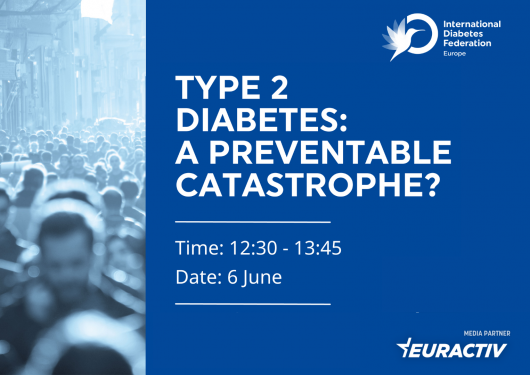Media Partnership: Type 2 Diabetes: a preventable catastrophe?
06-06-2023

Watch the recording here
Despite the progress in understanding and treatment of Type 2 Diabetes (T2D), the number of Europeans living with the condition continues to rise, causing unacceptably high numbers of premature deaths, equivalent to three jumbo jets crashing every single day. Today, 61 million people live with diabetes in Europe and this figure is expected to reach 66 million by 2030, with T2D accounting for about 90% of diabetes cases.
To raise awareness of the urgent need to adopt recent evidence-based recommendations in the management of T2D, IDF Europe is launching a new publication: “Type 2 Diabetes: a preventable catastrophe?”.
During the launch event, panellists representing academia, healthcare professionals, people living with T2D, industry and policy makers will discuss why we urgently need to adjust our healthcare systems across Europe and remove the barriers that are preventing early and tight management of T2D and its associated risk factors.
We would never accept three jumbo jets falling from European skies every single day… we can simply not accept the same number of people (half a million in 2021) dying prematurely every day in Europe because of preventable diabetes-related complications. We can do something about that. And we must.
Join the conversation and learn more about our call to action on June 6!
Organiser: International Diabetes Federation Europe
Supporter: Lilly Diabetes
Media Partner: EURACTIV
Location
Hybrid
Brussels Network Office - International Press Centre
1 Bd Charlemagne // 2nd floor
Panellists
Prof. Nebojsa Lalic
IDF Europe Regional Chair – Opening remarks
Erik Werson
Person living with type 2 diabetes – Testimonial: the personal experience of a person living with T2D, from diagnosis to treatment implementation.
Prof. Kamlesh Khunti
Professor of Primary Care Diabetes and Vascular Medicine at the University of Leicester and Leicester General Hospital, UK – T2D and the legacy effect: why is it critical to act early at diagnosis?
Prof. Tadej Battelino
Head of the Department of Pediatric and Adolescent Endocrinology at University Medical Center Ljubljana, Slovenia – Overcoming therapeutic inertia: early therapy intensification with disease-modifying medications to improve health outcomes for people living with type 2 diabetes.
Franc Bogovic MEP
The MEP Interest Group on Diabetes - MEPs Mobilising for Diabetes (MMD) - Reducing the burden of T2D on people and health systems: is there a political will?
Maurizio Guidi
Chair of the European Federation of Pharmaceutical Industries and Associations (EFPIA) Diabetes Platform - Overcoming barriers to the implementation of clinical recommendations: reducing inequalities within and between countries
After their initial statements, our guest speakers will engage in a panel discussion about the current barriers preventing early and tight control of T2D and its associated risk factors, and the role that people living with diabetes, healthcare professionals, policy makers, payors and industry can play to tackle these challenges and avoid the development of long-term complications and premature mortality in T2D.
Moderator
Mariam Zaidi
EURACTIV
Schedule
12:30 – 12:35 Welcome and opening remarks
12:35 – 12:50 Panellist statements
12:50 – 13:40 Discussion and Q&A
13:40 – 13:45 Closing statements
Followed by a light networking lunch.
Contact
Síofra Gilmore
siofra.gilmore@euractiv.com




